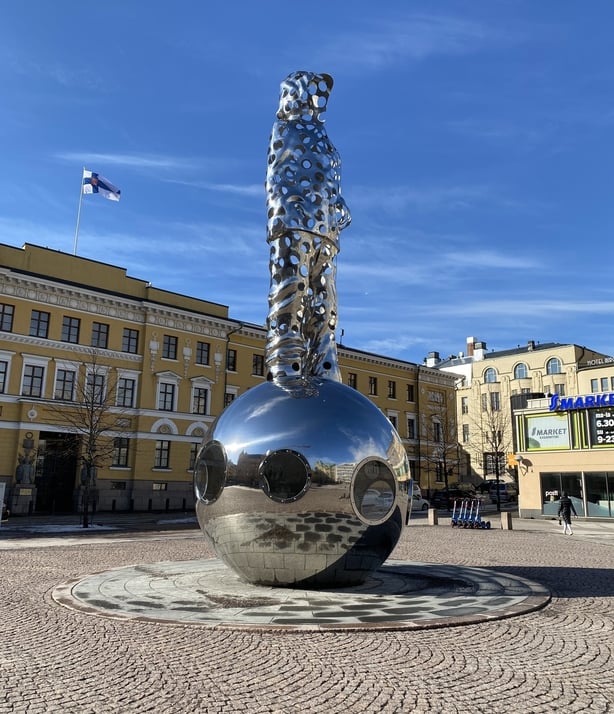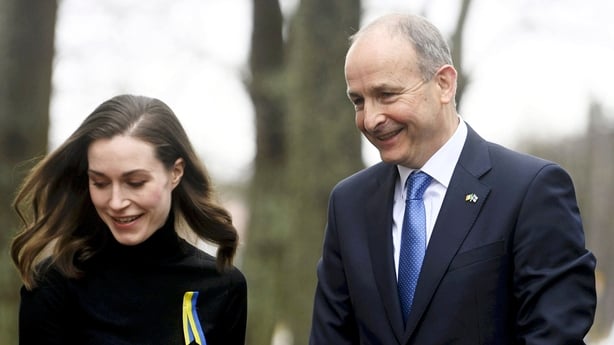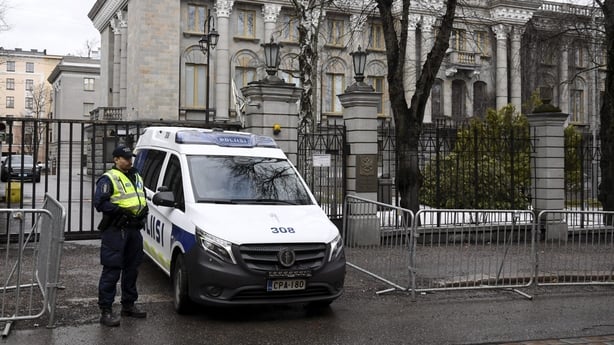On Saturday morning in Helsinki city centre, the spring sunlight is bouncing off the stainless steel Winter War Memorial and sending sharp reflections across Kasarmitori Square.
The memorial titled "He Who Brings Light" stands in remembrance of the 25,000 Finns who lost their lives in a 105-day war with the Soviet Union between November 1939 and March 1940.
At the time, Finland received widespread international support and managed to retain its independence; but it did have to cede more than a tenth of its territory leaving in excess of 400,000 people displaced.
Unveiling the memorial five years ago, former Finnish president Martti Ahtisaari said that war was one many serious crises Finland has faced in its efforts to maintain: freedom, democracy and the rule of law.
A YLE News opinion poll late last month suggested that 62% of people are favour of joining the NATO military alliance.
The statue, with its multiple holes but still standing resolutely, is particularly pertinent these days as Finland steps up preparations for a fresh crisis, albeit one laden with historic echoes.
Prime Minister Sanna Marin will tomorrow bring a report to the Finnish parliament that reflects what she described as the "fundamentally changed security landscape" in the aftermath of Russia's invasion of Ukraine.
The report, which will be debated extensively over the next few weeks, looks at the defence implications for Finland with a focus on border and cybersecurity along with the threat posed by hybrid attacks.

If any extra impetus was needed to commence this work, then the cyber attacks on the websites of both the Defence Ministry and the Foreign Ministry on Friday would have demonstrated once again the urgency of the upcoming task.
It is just the first of a series of crucial debates that will commence in parliament in the weeks ahead.
The key one, perhaps, is the comprehensive national discussions set to get under way about joining NATO.
Even though such a move would be momentous, especially given that Finland stayed non-aligned militarily during the Cold War, the pace of events here means that a decision will be taken swiftly.
"I think we will end the discussion before midsummer. I think we will have very careful discussions, but we also are not taking any more time than we have to in this process, because the situation is of course very severe," Prime Minister Marin told RTÉ News after her meeting with the Taoiseach on Friday morning.

On the streets of Helsinki there appears to be a growing feeling that NATO membership is now necessary.
Even warnings from the Kremlin that it would respond to such a move with what it cryptically termed rebalancing measures, is not diminishing fast changing sentiment towards NATO membership in Finland.
A YLE News opinion poll late last month suggested that 62% of people are favour of joining the NATO military alliance.
This was a nine point increase on the previous poll in February.
Even more tellingly, when the same question was asked in 2017 just 21% of people supported the idea at that time.
The changing opinion is evident in the casual conversations of people in Helsinki, as they carry on with their daily lives in a largely relaxed manner.

There is no panic in the air yet the firm belief that preparations must be stepped up for all eventualities is pervasive.
They believe this is necessary given the activities of what some ironically describe as their "peaceful neighbour".
There is nothing gung-ho about it all though, just a sense among people that the world has changed quickly and a country renowned for its long-term planning must stoically prepare for a new reality.
